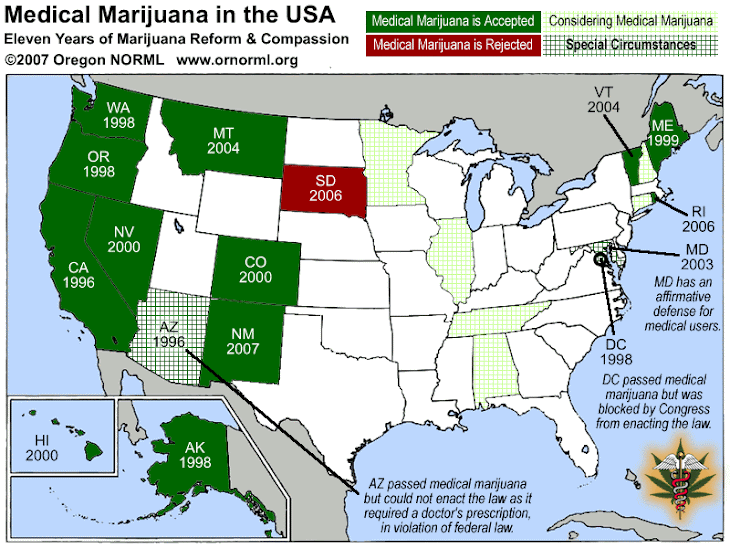This week, a ballot initiative to legalize marijuana possession for adult residents of the State of California, qualified for a statewide ballot. The Regulate, Control and Tax Cannabis Act of 2010 is coming up for a vote in November 2010.
Supporters of the initiative collected well more than the 433,971 signatures needed for it to be put before voters in the fall.
This will again put the state of California at at the forefront of the nation's drug debate.
The measure's main advocate is Richard Lee, an Oakland marijuana entrepreneur who savored the chance to press his case with voters that the state's decades-old ban on marijuana is a failed policy.
Lee proclaimed:
"We're one step closer to ending cannabis prohibition and the unjust laws that lock people up for cannabis while alcohol is not only sold openly but advertised on television to kids every day."
Lee tapped into $1.3 million from his businesses to advance this cause. And he has put together a highly organized campaign that he emphasized Wednesday would be led by a team of experienced political consultants, including Chris Lehane, a veteran operative who has worked in the White House and on presidential campaigns. "There's all kinds of big professional politicos who are coming on board now to take it to the next level," Lee said.
Opponents have also started to put together their campaign. "There's going to be a very broad coalition opposing this that will include law enforcement," said John Lovell, a Sacramento lobbyist who represents the California Police Chiefs Assn. and other law enforcement groups. "We'll educate people as to what this measure really entails."
The measure, like the medical marijuana initiative, could put California on a collision course with the federal government since the possession and sale of marijuana remain a federal crime.
However, the federal government has been evolving its stance since President Obama took office. For example, this month, President Obama's drug czar, R. Gil Kerlikowske, decried legalization in a speech to police chiefs in San Jose. The initiative would allow adults 21 or older to possess up to an ounce for personal use.
In the state of California, Possession of an ounce or less of Marijuana has been a misdemeanor with a $100 fine since 1975, when Attorney General Jerry Brown (who was then governor) signed a law that reduced tough marijuana penalties that had allowed judges to impose 10-year sentences.
Legalization supporters note that misdemeanor arrests have risen dramatically in California in the last two decades. The initiative would also allow adults to grow up to 25 square feet of marijuana per residence or parcel.
But the measure, known as the Regulate, Control and Tax Cannabis Act, goes further, allowing cities and counties to adopt ordinances that would authorize the cultivation, transportation and sale of marijuana, which could be taxed to raise revenue.
With the State of California in dire financial straits, supporters hope this feature will win over voters watching local governments jettison employees and programs in the midst of a severe budget crisis.
Three other marijuana legalization initiatives have been floated this year but are not expected to qualify for the ballot. One failed, one was withdrawn and one remains active.
Lovell said that the initiative would lead to increased marijuana use, cause the same kind of social ills as alcohol and tobacco and put more demands on law enforcement. He said voters are distressed by the medical marijuana law. "Neighborhoods feel very uncomfortable with these locations that have a lot of dope and a lot of cash," he said.
Lee disputed these claims and argued that the state's experience with medical marijuana shows "the sky didn't fall." He said the measure would allow police to focus on serious crime, undercut Mexican drug cartels and make it harder for teenagers to buy marijuana.
Lee intends to bring law enforcement support into his legalization campaign efforts. Lee's campaign on Wednesday highlighted the support of retired Orange County Superior Court Judge James P. Gray, a former L.A. County deputy sheriff and Torrance police officer.
With polls showing that a slim majority of voters support legalization, the legalization campaign will be trying to appeal to a slice of undecided voters who are mostly mothers. "It's always easier for people to say no than to say yes for an initiative," said Mark Baldassare, the pollster for the Public Policy Institute of California.
Lee hopes to raise as much as $20 million. He hopes to tap a handful of wealthy advocates who have supported efforts to relax drug laws, including multibillionaire investor George Soros and George Zimmer, founder of the Men's Wearhouse, who has donated at least $20,000.

